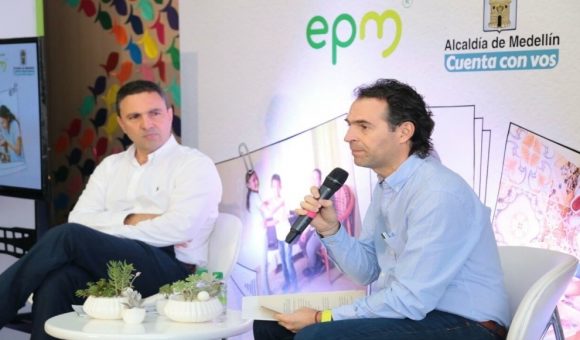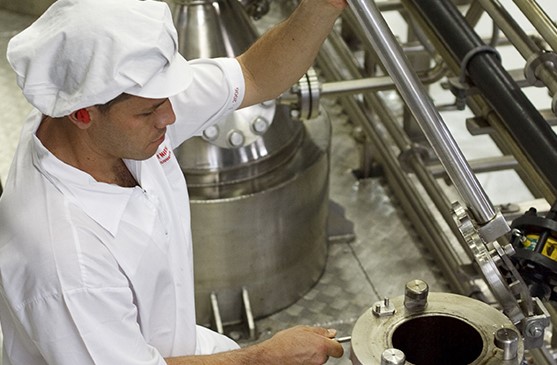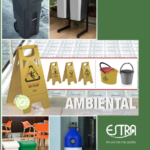ProColombia Unveils New Export Strategy; Medellin, Antioquia Leading

ProColombia – the government export and investment promotion agency – announced September 2 the launch of a new business information service in order to boost Colombia’s exports of goods other than petroleum and minerals.
The plunge in oil prices and the rise in the value of the U.S. dollar against the Colombian peso has taken a big bite out of government revenues.
But the soaring dollar also opens new opportunities for exporters of manufactured goods, agricultural products and traditional sectors including coffee and cut flowers, as ProColombia president María Claudia Lacouture explained in a press conference (see photo).
Even before the oil plunge and the dollar rise, Colombia’s non-petroleum, non-mining exports already rose 18% between 2010 and 2014, she added.
The agency has just upgraded and expanded information on its web-site, showing how it can help exporters determine what to export, where, how and with whom, she said.
“The message we want to send to impresarios is that if you’re already exporting, then export more; if you stopped doing it, try it again; if you never have done it, now is the time to do it – and ProColombia will show you how.”
New ‘Mipyme’ Export Assistance
For small and medium-sized enterprises, ProColombia recently launched the “Mipyme Internacional” program, which aims to help add 1,000 companies to the list of Colombian exporters, she said.
During the first phase of the program, ProColombia chose 33 companies for its assistance, 18 of which are already ready to export. Nine others are already exporting to Canada, the USA, Puerto Rico, Dominican Republic, El Salvador, Guatemala, Aruba and Panamá, she said.
Just over half of these companies are manufacturers — mainly producers of clothing, with the others producing agroindustrial products, according to ProColombia.
By 2016, ProColombia aims to have at least 100 more small-and-medium-size companies joining the ranks of exporters through the new program.
Antioquia Leads
According to a separate but related ProColombia study, Antioquia is now the biggest single exporter from Colombia of non-petroleum, non-mining goods.
In addition, a recent Agencia de Cooperación e Inversión de Medellin y el Área Metropolitana (ACI – Medellin’s investment promotion agency) study found that foreign direct investment in Medellin hit US$683 million in 2014, six times the investment level in 2010, the ProColombia study noted.
In total, 20% of all goods exported from Colombia are from Antioquian enterprises, according to the study.
What’s more, Antioquia has boosted such exports by 21.5% in the past five years, as well as receiving six times more foreign investment in 2014 versus 2010, according to the study.
Currently, more than 63% of Antioquia’s exports come from non-mining industries, according to ProColombia. That statistic may surprise many, given Antioquia’s long history of gold mining.
Glass containers, plastics, fresh flowers and household products were the leading export sectors from Antioquia during 2014, according to ProColombia. The USA, Mexico and Ecuador were the three main destinations of Antioquian exports.
In the agro-industrial sector, target products from Antioquia for export expansion include forest products, natural rubber, cacao and derivatives, coffee, bananas, avocados, asparagus, flowers, beef and dairy products, according to the study.
Novel exports from Antioquia in the ag sector now include organic fresh herbs and novel tropical fruits such as uchuva, the study noted.
As for the industrial sector, target products for export expansion from Antioquia include clothing as well as goods and services for the construction industry.
In the services sector, targets for further expansion include convention tourism, medical/dental tourism and ecotourism, according to the study.
In order to boost foreign tourism to Antioquia, ProColombia has recently concentrated its efforts in the USA, Canada, Mexico, Costa Rica, Aruba, Curazao, Peru, Argentina, Germany, the UK, France, Spain, Japan, India and Israel, according to the study.
Wedding and honeymoon tourism, luxury tourism, bird-watching and nature tourism are among the newer areas being promoted by ProColombia for visitors to Medellin and Antioquia, according to the study.
Other strategic “clusters” targeted for more development in Medellin and Antioquia include technology and software company expansions, electrical energy production and related services, and aeronautical services, where a big expansion is now underway at the Rionegro (Medellin international) airport, the study noted.
















